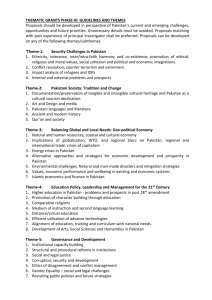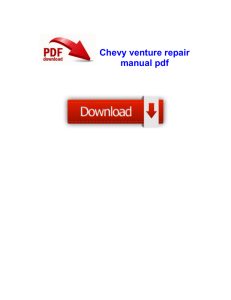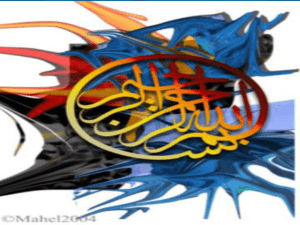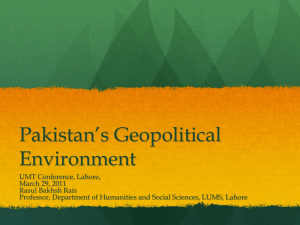1 - Mahmood Mirza
advertisement
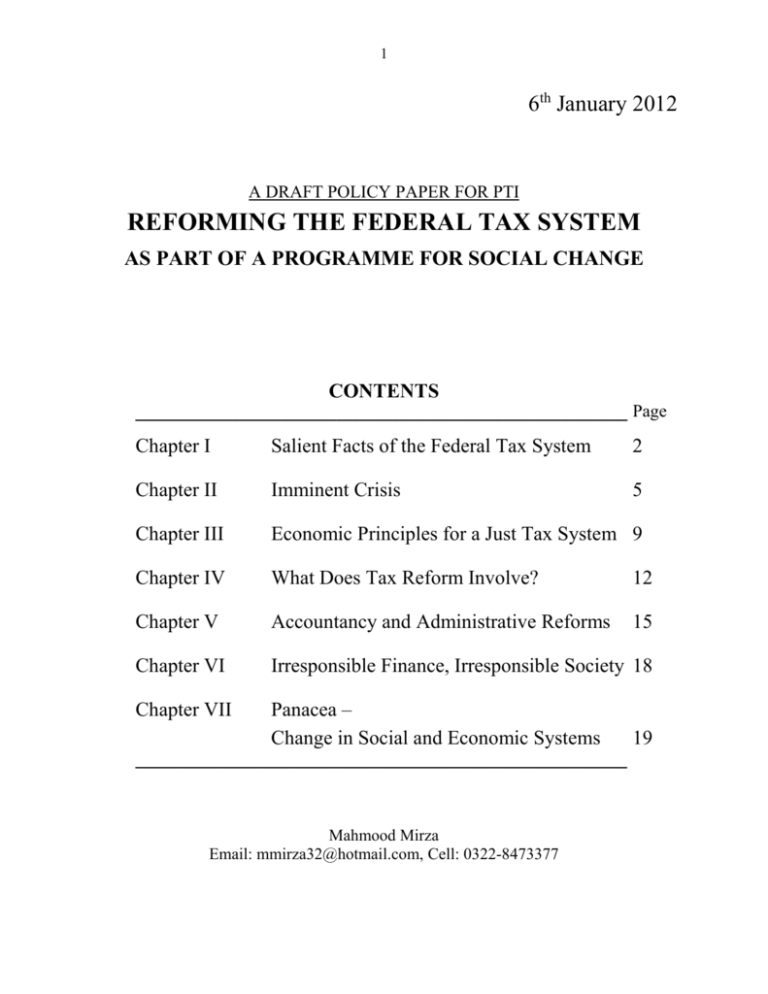
1 6th January 2012 A DRAFT POLICY PAPER FOR PTI REFORMING THE FEDERAL TAX SYSTEM AS PART OF A PROGRAMME FOR SOCIAL CHANGE CONTENTS _________________________________________________ Page Chapter I Salient Facts of the Federal Tax System 2 Chapter II Imminent Crisis 5 Chapter III Economic Principles for a Just Tax System 9 Chapter IV What Does Tax Reform Involve? 12 Chapter V Accountancy and Administrative Reforms 15 Chapter VI Irresponsible Finance, Irresponsible Society 18 Panacea – Change in Social and Economic Systems 19 _________________________________________________ Chapter VII Mahmood Mirza Email: mmirza32@hotmail.com, Cell: 0322-8473377 2 CHAPTER I SALIENT FACTS OF THE FEDERAL TAX SYSTEM During the financial year 2011 ‘consolidated tax revenue’ of Federation and Provinces amounted to Rs. 1,669.3 billion. Including ‘non-tax receipts’ Rs. 553.5 billion the ‘consolidated revenue’ rose to Rs. 2,252.9 billion. The consolidated expenditure amounted to Rs. 3,447.3 billion (This included development expenditure Rs. 514 billion). Overall fiscal deficit Rs. 1,086.7 billion was equivalent to 6.6% of GDP against a target of 4%. (Figures extracted from State Bank Annual Report 2010-11) Consolidated tax-GDP ratio came to 9.2%. Tax-GDP ratios of Sri Lanka and India are around 15% and 16%, respectively. To remedy the fiscal problem, Pakistan has to cut non-development expenditure and raise tax revenue. This paper deals with some aspects of the federal tax revenue. 2. Tax revenue of the Federal Government was Rs. 1,558 billion. 40% of it statedly comes from direct taxes and the balance 60% from indirect taxes. The percentages are technically incorrect. Technically correct ratio of direct tax to total tax would come to around 30% and that of indirect tax to around 70%. Pakistan is collecting a large amount of indirect tax under the Income Tax Ordinance. This collection is shown as direct tax to raise its ratio. Of the federal direct taxes, 95% is income tax. About 68% of income-tax is contributed by the corporate sector. Major corporate taxpayers are banks, multinationals, telephone companies, gas and petroleum corporations. About 4% of income tax is contributed by the salaried class. Remaining 28% is contributed by traders, transporters, commission agents, suppliers, contractors, physicians, advocates, chartered accountants and all others. (Retail traders are around 1.2 million. But those declaring a turnover exceeding 5 million are a few thousand only). Structure of Indirect Tax is as follows: Sales Tax 65% Customs 20% Excise Duty 15% Percentages have been rounded off. 3 A large amount of sales tax is collected in advance by the custom authorities at the import stage. High imports fetch high sales tax. 3. Behaviour of taxpayers and tax collectors towards each other is negative. Ordinarily a taxpayer (other than a big company) does not realize that tax is a cost of civilization. Culture of non-compliance flourished as the state was incapable of enforcing tax laws. General Musharaf patronized evasion of tax by conniving at the provisions that required filing of statements of profit and loss, balance sheet, personal expenditure and wealth. Many medium and big taxpayers have accumulated black wealth which they are reluctant to whiten or disclose. Black wealth generates speculative profits, adding to the stock of black wealth. The attitude of tax the collectors too, is negative. Even honest tax collectors are no exception. Whenever FBR gave them power to “audit” cases of businessmen, they rejected accounts on flimsy grounds and usually assessed unjust tax. Even quoted public companies were not spared. Most businessmen in the non-corporate sector do not admit that they maintain accounts. Their statements usually are not true. They do keep informal accounts. 4 Tax evasion in 2007 was around Rs. 800 billion (World Bank Report). It is much more now. In no society do people willingly pay tax. They are pushed by the system to do it. Effectiveness of the system varies from country to country. Where a state has a data warehouse and the tax collectors use the data efficiently, the tax gap is narrow. (Tax gap is the difference between tax potential and tax recovery). Tax gap in Pakistan is 79 %. It is 22% in the US and 10% in the UK. In Pakistan tax potential is weakening. Causes for Pakistan’s low potential are low level of technology and non-documentation of economy. Recent causes are high prices of electricity and gas, high rate of interest, declining expenditure on development and declining demand for goods and services. Smuggled goods and under-invoiced imports cause double jeopardy. There is (i) revenue loss and (ii) the indigenous producers are at disadvantage. 4 5. All along the government lacked the ‘will’ to enforce tax laws. But ‘will’ of the government alone may not achieve much. It needs much more. It is explained in the next pages. 6. Leadership of the business community is usually held by persons who accumulated most of the wealth by ‘easy money’ methods such as (tax-free) dealings in stock exchange and property. Many persons holding political and state power have a similar repute. A question, therefore, arises as to how will an atmosphere conducive to tax compliance come about? Can sheer use of coercive power of state do the trick? Not much. 7. Tax laws of Pakistan provide incentives for investment and promotion of knowledge-based economy. Conditions within the country, however, did not allow the incentives to fructify. If one can “accumulate” wealth by foul means or easymoney methods why should one make effort to “earn” wealth through genuine “productive” activity? 8. Tax and other laws of Pakistan were liberalized for international trade. But we failed to boost our exports. The goods and services we produce and export are low-tech and of low value. Now the world economy is knee-deep in recession. What to do then? How to go ahead? This matter will be discussed in chapters II and III. 5 Chapter II IMMINENT CRISIS 1. Pakistan is facing a grim financial crisis. In the coming months the situation will become graver. The new government will have to grapple with circular debt, rising food prices, high unemployment and a crushing burden of debt. There will continue to be shortages of electricity and gas, and their high rates. Perhaps the law and order situation will be worse. The future government will deal with these problems while coping with a hostile geopolitical situation. 2. The initial effort for correcting the situation should include the following steps: (i) Austere living of leadership. (ii) Elimination of waste and reduction of non-development expenditure. (iii) Control of corruption in government. (iv) Elimination of losses in public sector undertakings. (v) Control of theft of electricity and conservation of energy. (vi) Reduction in size of government. (vii) Discouragement of easy money making. (viii) Improvement of relations with neighbours and review of the security policy. Some ideas are easy to put into practice, others involve greater effort. If government leaders and elected representatives of the governing party adopt austere living, the problems may somewhat ease. Once the state substantially curtails non-development expenditure partial success will be achieved. 3. The new government will need large financial resources for debt servicing and development. Will tax evaders come forward to pay full tax? No, never. Some inspired tax payers may pay tax somewhat higher than they used to. Increase will not be substantial. 6 Even in documented economies tax is collected by force of law and effective tax machinery. Effective enforcement in an undocumented economy, like Pakistan, is impossible. As explained hereafter there are genuine difficulties in documentation. It will take years to overcome difficulties. In the meanwhile, the wheels of the government will have to move, which need money. Will the government refuse to service its debt obligation? Or will it service the debt by raising an additional loan from (i) IMF (ii) or friendly governments (iii) or non-resident Pakistanis? It is difficult to foretell. Will wealthy non-resident Pakistanis offer billions of dollars in cash to pay off debts? Perhaps not. It is easy to get money for investment than for servicing debts. Again it will not be easy to bring back stolen money lying in foreign banks or invested in assets abroad. It will take a long time to succeed. Degree of success cannot be foretold. Most of the money will come of its own volition after economy and law and order stabilize. 4. The governments of Mian Nawaz Sharif, Miss Benazir Bhutto, Gen. Musharaf and Mr. Zardari took cruel measures to raise revenue: (i) (ii) (iii) (iv) (v) (vi) Levied tax on fictional income in place of actual income. Raised rates of indirect taxes: sales tax, excise duty. Raised tax rates / prices of petrol, gas and electricity. Raised rate of taxes recovered in advance or deducted at sources. Printed currency notes. Levied tax on the value of agricultural raw materials supplied to industrial units. If the PTI takes similar measures, it will further raise price level and incur the wrath of the consumers, traders and industrialists. How will it distinguish itself from the preceding regimes? And how will the PTI face the people affected by higher prices? People, in fact, expect the PTI to improve their lot by bringing about social change. What is the definition of change and how much time will it take to produce result? The people do not know. 7 Dealing with IMMEDIATE crisis Let us first state pre-conditions for remedying the ongoing crisis: (i) The society must undergo attitudinal change. (This is a part of social change and not a comprehensive social change. See chapter VII). (ii) All types of support to religious extremists and militants must end. Let there be peace and respect for constitutionalism. Following measures will help tide over the ongoing financial crisis: I Let big landlords take the first step: Pay tax on agricultural income at the rates prescribed for individuals under Income-Tax Ordinance 2001. II Chapter V gives proposals for reforms in Federal Tax system. Some proposals can be put into practice within a few weeks. These will somewhat increase tax receipts. But the situation will markedly improve only after documentation of economy takes place. III. It appears the OECD countries will not be able to rescue us from fiscal or BOP deficits. These countries are in recession which is likely to deepen into depression. Private remittances may fall. The situation demands sacrifice particularly from the elite. Adopt austerity. Let the state devote resources to education and development: non-luxury housing, roads, energy. Produce nutritious food. It is in high demand in Pakistan and abroad. Broadbase production and prosperity. IV Role of Non-resident Pakistanis: Once non-resident Pakistanis are sure that Pakistan is set for a reformative programme, they may come forward to make their contribution. V They may help by providing development fund on mutually agreed terms. The sectors requiring ‘immediate’ attention are the following: (i) Natural gas – schemes already defined by experts. (ii) Small units for generation of hydel electricity – schemes already planned by experts. 8 (iii) Upgrading production of small and medium industrial units – several studies exist. (iv) Utilizing idle industrial capacity already installed – a thorough study needs to be made. (v) Support peasant proprietors to adopt scientific (a) farming, (b) irrigation, and (c) marketing etc. Ample literature exits. Success in these fields is relatively easy. It will provide additional revenue and space to the PTI government to consolidate. A mid-term programme is defined in the coming pages. 9 CHAPTER III ECONOMIC PRINCIPLES FOR A JUST TAX SYSTEM Objective: To achieve higher tax revenue and socio-economic development within egalitarian framework. 1 Tax laws of the PTI shall discourage high consumption and encourage savings. Objective: generate local resources for investment. 2 Income-tax law shall discourage short term trading in immovable property and all ‘easy money’ opportunities for accumulation. ‘Easy money’ is a way of life and leads to financialization of economy and speculative rise in prices of financial assets and real property. This the PTI will avoid. The PTI will concentrate on developing ‘real economy’. 3 Tax laws shall incentivize production of goods and services consumed by the common people. 4 Tax laws shall promote production and export of value-added goods. However, as long as recession prevails in the OECD countries, we should prefer producing goods for which demand necessarily exists such as cheap nutritious food. 5 Burden of taxation shall shift from tax on goods and services to tax on income and property, in a gradual manner. 6 The PTI shall withdraw exemptions given to the privileged classes. 7 Presumptive Income-tax: This unjust tax (on presumed income) was introduced by Muslim League Government of Mian Nawaz Sharif in 1991. His government was unable to get income-tax under the normal procedure. It introduced concept of “fictional income” to collect tax in a defiant society. The PTI shall correct the situation and start levying tax in accordance with the normal procedure i.e., according to actual income. It will be a painful job and is not possible without a behavioural change. 8 The rate of General Sales Tax / VAT on goods of mass consumption shall generally be low. As an alternative let the tax be levied at every stage/ transaction at a lower rate without adjustment of input tax. This matter needs a thorough discussion among the stake holders. The consensus will be enforced with the support of people. 10 9 The Wealth tax will be levied on assets which do not produce income or which do not contribute to the national production. The PTI will not approve idle wealth. Assets in respect of which Zakat is paid, by depositing into the approved Zakat Fund, will be exempt from Wealth Tax. 10 Estate Duty will be levied on the wealth, above a specified limit, bequeathed by a wealthy person except that allocated by a “will” to be transferred to a “public welfare trust” setup for the promotion of health, skill, science, technology or that donated to a micro-credit institution. One residential house, not being a ‘farm house’, shall be exempt from Estate Duty. Objective: Let the society also benefit from the wealth it enabled the deceased to accumulate during his life. (Pakistan needs such an Ijtehad). 11 Money Laundering Any proposal to reform income tax law will not produce result as long as foreign remittances enjoy immunity from scrutiny. Mostly black wealth has been whitened by routing it through mechanism of remittances. It costs 1 to 2 % to whiten the black wealth in this manner. The Government of Pakistan enacted Anti-Money Laundering Ordinance to enable it to carry out scrutiny of the source of remittance. If the Government of Pakistan sincerely scrutinizes remittances it may initially discourage private remittances. This may aggravate the problem of balance of payments. PTI shall take corrective measures carefully. The PTI shall curb illegitimate practices. Unless the party does it, evasion of income-tax cannot be effectively checked. 12. To help create a just society we have to broaden the tax base and broadbase creation of wealth. For these purposes Pakistan has to support development of small and medium enterprises and medium size peasant proprietors. These measures will build a large middle class as in Turkey. This will upgrade our civilization leading to establishing civilian supremacy in socio-political life. This is, however, one condition: population growth has be brought down to one percent or less. 13. National Consensus The PTI will work for a national consensus: (a) (b) To promote documentation; To take exemplary action against delinquents who refuse to improve despite repeated warnings and lesser coercive action. Before taking these steps the PTI shall withdraw favours given to some classes on the basis of privileged position; 11 14. Taxation and Welfare The PTI considers tax reform an essential part of an overall agenda of sociopolitical reform. Raising the tax-GDP ratio is essential to build a welfare system. Only a country capable of establishing a Welfare State can achieve a taxGDP ratio in the vicinity of 30%. For this purpose (i) we have to base our economy on modern knowledge and (ii) insulate (as far as possible) the economy against crisis originating abroad. How to do that? See last chapter. 12 CHAPTER IV WHAT DOES TAX REFORM INVOLVE 1. Tax reform involves: (i) Making social atmosphere congenial for tax compliance. (ii) National consensus for documentation of economy. (iii) Educating the citizens about the role of taxation. (iv) Legislation to carry out reform. (v) Administrative machinery for implementing the reform. 2. Congenial social atmosphere for tax compliance: (i) High degree of tax evasion, as in Pakistan, is a part of all-pervading corruption. To control evasion of tax, the nation has to attack corruption. To begin with the PTI will make the business of Government transparent. (ii) For fostering an environment of tax compliance, tone has to be set by the national leaders and the elite. Ruling classes, high officials and big landlords will lead in paying taxes and practising austerity. This will help bring attitudinal change in society. (iii) It is necessary to dispel the view that the income and wealth of the ruling elite is beyond scrutiny. The proposals on this behalf are: (a) Candidates for elected offices will be required to and source-wise income in Pakistan and abroad. of spouse and dependants will also be declared. filed annually in the office of Chief Election displayed on the Election Commission’s website. declare their wealth Wealth and income Statements shall be Commissioner and 13 (b) Tax collectors having jurisdiction on these persons shall check the information so filed with the tax record. Any negligence on the part of tax collectors will be a cognizable offence. If any default comes to notice, tax collectors will take action and report to the Election Commission accordingly. The Election Commission shall have access to the record of tax department and power to call the tax officials as witnesses. (iv) There shall be no sacred cow. Assets, sources of income and expenditure of the officials (civilian and military) shall also be scrutinized by an independent Scrutiny Commission assisted by the tax department. The government officials do file wealth statements annually, but these are not put to scrutiny. The Commission scrutinizing statements of the provincial employees shall be appointed by the relevant High Court and the Commission scrutinizing statements of the federal employees shall be appointed by the Supreme Court of Pakistan. (v) If the Election Commission or the Scrutiny Commission, as the case may be, considers an exhaustive enquiry necessary, the matter may be referred for judicial enquiry. A specialized court having knowledge of commerce and accountancy shall be set up for this purpose. 3. Conditions for efficient performance of the system: (i) The PTI shall create an atmosphere of confidence between the taxpayers and tax collectors. Such an atmosphere will come about if the tax payers are sure that the money they pay will be spent for welfare and development. (ii) The parliament shall appoint a “Welfare Committee” to propose budgetary allocations for social sectors. If the recommendation of the Committee is not accepted by the Government, it shall publicly explain reasons therefor. 14 (iii) The Federal Board of Revenue must set up an “information warehouse” to collect information about the ownership of properties and bank deposits etc. If such information system is in place, and put to use in scrutinizing statements of income and wealth, most of the tax payers dare not make misdeclarations. (iv) Both the tax payer and the tax-collector should be accountable. There already exists a provision in law to take action against taxpayers for concealment etc. The tax collector shall also be taken to task if he or she acts malafide or commits gross negligence. Let fairness prevail in all sections of the tax system. (v) The PTI Government shall ensure certainty about the tax laws and procedures. Frequent changes shall be avoided. (vi) The PTI Government shall be CONSISTENT AND FIRM in implementing its policies. 15 CHAPTER V ACCOUNTANCY AND ADMINISTRATIVE REFORMS (i) Tax recovery will not substantially increase without improving documentation of economy. Documentation will not improve as long as the corruption culture dominates. And culture does not change suddenly, it is reformed gradually. (ii) The PTI Government shall take gradual steps for documentation of business transactions. It may begin by liberally accepting accounts, even if these are defective by book, so long as: (a) Sales are evidenced by serially numbered cash memos / bills. This is essential. (b) As regards other accounts (prescribed by law) strict compliance is not expected in the initial stage. (c) Payments of expenses are “substantially” made through bank. This is essential. (iii) The appellate authority to hear the appeals, relating to tax assessment, shall be independent. It shall not be under the control of an executive authority such as the FBR. The appellate authority dealing with Federal Taxes shall be under the administrative control of the Supreme Court of Pakistan, and the appellate authority dealing with Provincial Taxes shall be under the administrative control of the High Court. (iv) If an appellate authority gives a finding that a tax collector acted viciously, disciplinary action shall be taken against him by an “independent” Disciplinary Committee. 16 (v) The Tax Collectors shall be adequately paid. They shall be provided with concessional residential houses. There should be a proper arrangement for education of their children. Documentation (a) Where a manufacturer steals electricity, he also suppresses production. Many imports are under-invoiced. Many goods are smuggled into Pakistan. In the circumstances, a trader does not get invoice for his purchases. None of our Governments could control smuggling, under-invoicing etc. Traders, therefore, have genuine difficulty in issuing sale invoices. The difficulties have never been attended to adequately. These difficulties must be removed to expect improvement in account keeping. Let us begin by documenting sales relaxing for now the verification of purchases. (b) Big and medium class traders shall be required to keep electronic cash register. Small traders shall be facilitated to buy these in instalments. (c) Consumers shall be mobilized to get cash memos from the big and medium class traders. To persuade the consumers to insist on cash memos lottery system may be introduced. Let the consumers submit their cash memos to the ‘area lottery committee’ set up by Internal Revenue Service which may set up a system for drawing lottery in each bazaar/ town. The winner of the lottery will be given a gift coupon honoured by the Government. (d) Emphasis shall initially be on the proper recording of the sales so that the receipts of GST improve. GST rate may have to be reduced. The apparent loss, by reduction in tax rate, will be off-set by enhanced recovery as a result of documentation. 17 The Finance Ministry shall hold a meeting of the representatives of the stake-holders every six months to examine measures taken to remove difficulties in keeping accounts. The relevant ministries, departments and trade bodies will take necessary action to implement the decisions taken by stake-holders and place their progress report in their next meeting for further action. (e) Every businessman shall be required to file a copy of the final accounts. Where a small trader or a small manufacturer does not keep accounts, or full accounts, he shall submit a statement on estimate basis. (f) After a few years big and medium businessmen will be required to get their accounts and assets audited by qualified auditors. 18 CHAPTER VI IRRESPONSIBLE FINANCE, IRRESPONSIBLE SOCIETY Financial condition of a state plays an important role in the national life. High revenue, equitably spent, fosters unity. Poor revenue generates feuds. For want of resources our state failed to allocate funds for health, education and skill-training of the population. The State had inadequate budget for research and development. Technological level of production remained low. This perpetuated poverty. The exchequer never had sufficient funds to build hospitals, roads, water reservoirs, energy resources and other infrastructure. Shortage and high cost of water and energy adversely impacted the life of people and the economy. Consequently social, political and economic development lagged behind. But the population grew producing an army of the uneducated and unemployed. Pakistan’s economy is throwing people out of jobs. It is creating price hike. Consequence: Poverty → Illiteracy → Extremism and Crime. A large number of those liable to tax are reluctant to pay, shifting blame on government that failed to provide security of life and property. Blame is true. They have a point that a part of the tax they pay is mis-spent or misappropriated by the state operators. But they miss the other point that they too are a part of the social system. They need to ask themselves what efforts they have made to get rid of the corrupt system. And will their denial to pay bring security or better service to the society? Tax payers cannot run away from their responsibility. They have to do both, pay tax and contribute to the national effort to purge the society of corruption. A state poor in finance, and controlled by the corrupt, can never do what the taxpayers wish it to do. 19 Chapter VII PANACEA: Change in Social and Economic Systems Taxation is a socio-politico-economico-administrative matter. The tax system is a part of total order. Taxation is rooted in politics. Is taxing the income of traders and agriculturists not a political matter? There is a need for civilizational upgrading to obtain a high tax-GDP ratio. We have to change the society, social behaviour and administration by a wholesome approach. Tax reform will be a part of the total programme of social change. Let us first discuss what “social change” means. The concept of social change differs from man to man. Generally it means alteration of social order. In a diluted sense it means a new notion of social progress and governance. According to a simplistic view, change in social behaviour will serve the purpose. In practical terms, it means enhancing production within the prevailing framework by improving governance. Those who hold this view ask the people to wait (and suffer) until the benefits of development trickle down to them. Closer to it is the view that, in addition to behavioural change, ‘peripheral’ alteration in the socioeconomic structure should be also carried out. This is a gimmick to win over the people. Social thinkers with a humanist approach plead for a comprehensive change. They reject trickle down theory. They seek to replace the prevalent institutions and socioeconomic policies with new ones. They treat state power as a tool to bring about institutional and policy changes to root out poverty and its causes as early as possible. Perhaps narrow objectives (growth in GDP or revenue) are achievable by a milder version of change. However, if an early alleviation of misery of masses is 20 paramount, comprehensive social change is inevitable. The paper does not propose radical restructuring. The situation within the country and world system will not permit it. But status quo too will not deliver. The changes defined in the paragraph hereafter and chapter III are called for. 2. The matter deserves to be looked into in the global context as well. Pakistan is part of the global economy. The prevalent global “post-industrial” economic order is different from the economy of the industrial age. Since 1995 ‘finance capital’ has dominated the system. It has created wide inequality. Purchasing power is concentrated in the hands of the upper 5-10% class. Unutilized industrial capacity and low demand for goods and services have dampened the real economy, leaving millions unemployed. ‘Finance capital’ has a tendency to dabble in speculative dealings in financial assets, commodities and real property. There is a limit to speculative rises in prices. Eventually the bubble bursts as it did in 2008, upsetting the system. This deprived people of their purchasing power, their businesses and mortgaged houses. Now the whole economy and social life are in complete disarray, and the crisis is spreading. Welfare measures in numerous countries are being curtailed. Monetary and fiscal policies of the industrial age have failed. There is need for systemic change on the following lines: (i) to establish the supremacy of the ‘real economy’ over the ‘financial economy’, (ii) to establish a distributive system that will give people the power to buy the goods and services that the real economy produces, and (iii) to discard debt as a means of high consumption and non-development expenditure. The vested interests of financial capitalists, in developed countries will resist such change. Political parties and the media are in their grip. The crisis will endure or recur. But in Pakistan, one political party, the PTI, which stands for change, should do what it can within the national sphere. It could put our economy on a relatively safe trajectory. 21 To bring about relative stability in our economy, we need to insulate the exchange rate and stock exchange from the manipulations of ‘hot money’. We have to learn from China by (i) building foreign exchange reserve and (ii) controlling dealings in stocks and shares. We need to give prior attention to the real economy. It is in this context that the paper proposes “Economic Principles for a Just Tax System”. (Chapter III). First and last, let us be humane: we must look after the peasantry. In a lowtech populous country such as Pakistan 45% of the labour force earn their livelihoods from agriculture. Most of this labour force is poverty stricken. There is need to pay special attention to peasant proprietors (i) to provide gainful employment and food to the deprived rural population, (ii) to put money in their pockets broad-basing the market for wage goods, (iii) to bring about social emancipation in rural society, and (iv) to build a strong social base for stable economic progress. Can we become a humane, forward-looking equitable society?




